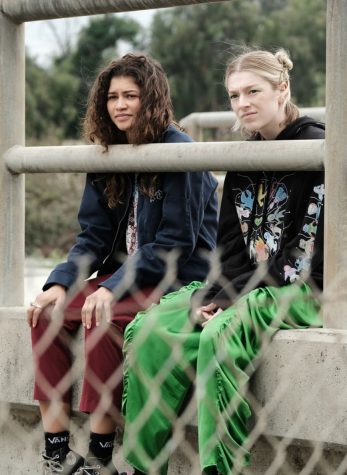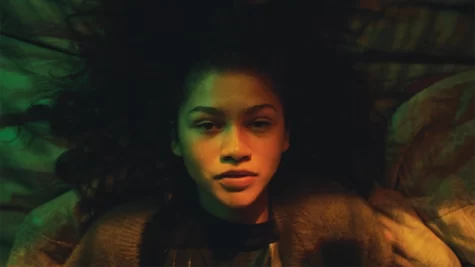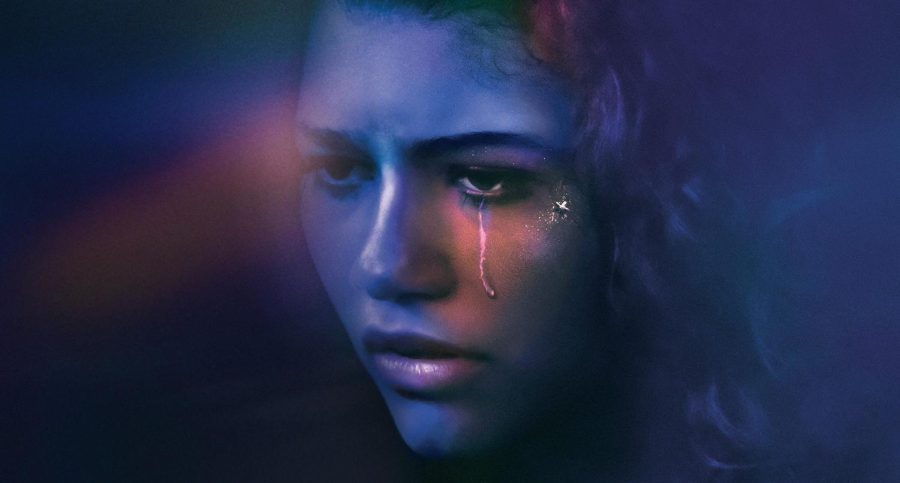“Euphoria”: outstanding diversity, but falls short
March 17, 2022
The highly anticipated second season of “Euphoria,” an HBO original, has caused a stir of approval from teens across the country due to the intense scenes that tell a disturbing and raw high school story. Although the show pushes boundaries by exploring serious and real topics in an in-depth and truthful way, its stereotyping and romanticization of drugs detracts from the show’s positive impact.
The season, which began airing on January 9 and is set to conclude on February 27, tells the story of Rue (Zendaya), a troubled high school student struggling with drug abuse. “Euphoria” follows Rue and her peers as they navigate identity, addiction, and relationships.
Throughout both seasons, one aspect of “Euphoria” that remains exceptional is the diversity. The show succeeds at casting actors who share experiences with the characters they play. The story includes a transgender woman, Jules, played by Hunter Shafer, who is transgender as well. Additionally, many of the characters and actors are queer and come from different racial backgrounds. Each character also explores unique problems. Rue’s drug addiction causes damage to herself and those close to her. While, Jules, Rue’s girlfriend, grapples with her gender identity and sexual orientation.

The diversity in the character backgrounds and storylines enhances the show as it allows its viewership to relate and empathize further with the characters. Media and television have always lacked diversity and the progressiveness of the show makes normally underrepresented groups feel welcome.
The show also succeeds in its portrayal of mental illness. Rue is diagnosed with multiple mental illnesses, with the most prominent being depression and bipolar disorder. Her manic and depressive episodes are unfiltered, not shying away from the scary and disturbing sides of the disorder. Long, uncomfortable scenes in dark lighting show her depression in a way that makes the viewer feel as if they are unable to escape her feelings.
During her manic episodes, the fast-paced dialogue and bright light create a feeling of being out of control. This theme is carried throughout the show. From love to relationships and mental illness, each scene is shadowed by a feeling of unease, fear, and uncertainty.
“Euphoria” is rated TV-MA because of its explicit language and disturbing scenes like these. The graphic and violent content may harm “Euphoria’s” younger viewers, as can the negative stereotypes the show plays into.
An example of the stereotyping that occurs in the show is the portrayal of Cal (Eric Dane), the father of Nate, one of Rue’s classmates. Cal is married to a woman but has privately accepted that he is gay. He is closeted and shown as very angry and violent, a common trope. In one scene, Nate (Jacob Elordi) confronts his father about his affairs with men, and the two engage in a physical fight. The revelation is especially shocking for Nate as his father is outwardly a typical white picket fence parent. His disgust for his father’s relationships pushes Cal over the edge, and he becomes extremely violent and out of control. This stereotype can be harmful because it continues to put all closeted, gay men in a box.

“Euphoria” also shows a disregard for lesbian relationships. In the second season, new student Elliot (Domonic Fike) becomes romantically involved with Jules, who is dating Rue. Both women, although they have never explicitly defined their sexuality, have said that they are only attracted to women. When Elliot and Jules become involved behind Rue’s back, it contributes to the idea that men have the right to insert themselves into lesbian relationships and diminishes their sexual identity.
Another issue with the show is its romanticization of drugs. Although some scenes involving Rue characterize drug abuse for what it is: messy, scary, and distressing, there are many other scenes at parties and school where using drugs is shown against a backdrop of glittery makeup, colorful lights, and pretty music. This portrayal of drugs as entertaining and aesthetic has the potential to be extremely harmful to malleable teens as it encourages their abuse.
“Euphoria’s” diverse characters and underrepresented subject matter are commendable, but the depictions are just as important as the topics themselves, and the harmful representation of drugs, violence, and stereotypes detract from the positive messages of the show.























![Check out Rose Howell's article "Teaching Conflict": https://bhsregister.com/9661/news/teaching-conflict/
“I know that some people have colleagues who disagree with me because they don’t think these conversations should happen in school, [but] where else should they happen then?” ~Social Studies teacher Francesca Dupuis](https://scontent-ord5-1.cdninstagram.com/v/t51.29350-15/404979361_1569222083889381_8162261023681050366_n.jpg?_nc_cat=101&ccb=1-7&_nc_sid=18de74&_nc_ohc=RHOhiTkucIgAX9i9OIz&_nc_ht=scontent-ord5-1.cdninstagram.com&edm=ANo9K5cEAAAA&oh=00_AfDvefW7hOPJEWQXiafhqZSFlGqW7IQC9rpAVV3pFKgt8w&oe=65B50250)
